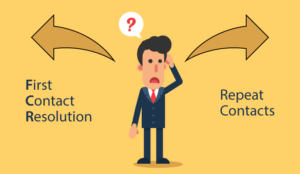Colin Hay of Puzzel outlines ten strategies for reducing customer call volumes.
Traditionally, contact centre leaders measured success on how quickly customer calls were dealt with, using Average Handling Time (AHT) to target advisors on performance.
Happily, many organisations are now questioning this metric and instead are looking at what it really means to deliver exceptional customer service. They have woken up and realised that the inside-out approach, where internal processes come before the customer perspective, no longer meets expectations.
What is more, digitalisation has changed the rules, bringing with it a multichannel contact centre environment and a new definition of ‘call volumes’.
A 2017 Call Centre Helper study suggested that inbound voice calls have decreased as the overall number of customer contacts. This indicates a clear shift by customers from voice to digital channels such as email, webchat, social media and SMS.
Trends like this throw the spotlight on how organisations manage multiple “channels”, the new word for “calls”, and if they really need all of those channels.
The real challenge for contact centre leaders is to remove contacts that are ‘preventable’ or ‘predictable’ and that offer no customer value, rather than to simply reduce the total number of calls, but how can this be achieved?
The following 10 strategies provide a practical guide to increasing the number of contacts that provide true customer value, regardless of channel:
1. Create actionable customer journey maps (CJMs) – don’t just create a CJM, put it into practice!
2. Know why customers are contacting you – involve your agents, the shop window of your organisation and first port of call for customers, and then back up their claims with clever technology such as speech analytics.
3. Proactively manage the customer lifecycle – introduce customer lifecycle management (CLM) to proactively manage ‘predictable’ situations, such as new customer welcome calls, promotional offers, courtesy calls and health-check calls.
4. Shift customers to self-service – when organisations can accurately predict why customers are calling, dramatic reductions in inbound call volumes can be achieved by shifting customers to self-service channels. These may include IVR, web page search and online virtual assistants or digital assistants and bots.
5. Get it right first time – the most effective way of reducing future call volumes is to resolve queries first time, on time and every time that customers make contact.
6. Act on customer insight – the information contained within customer contacts, if mined and used appropriately, can assist in better understanding customer needs, improving call scripts and agent training, resolving problems and enhancing business processes.
7. Make customer communications clearer – avoid complicated pricing, unclear legislative information, badly laid-out or worded forms, letters and bills that confuse customers and encourage them to call for an explanation.
8. Maintain a unified view of the customer – agents need to know that the person they are speaking to over the phone is the same person who emailed yesterday and made contact via Twitter the day before – and they need to know and understand the nature of those conversations to avoid going over the same issues and wasting time.
9. Create self-help videos and customer forums – online customer forums have for many years helped to reduce the volume of inbound customer contacts. Bring them bang up to date by featuring videos on channels such as YouTube for product or “how to” queries.

Colin Hay
10. Use use customer feedback effectively – but don’t just restrict feedback to what customers thought of their last experience. Build feedback tools into systems to give customers as many opportunities as possible to provide feedback.
By following these ten simple strategies, organisations can actively reduce demand for live agent service, add real value to the customer experience and boost satisfaction and loyalty.
Author: Puzzel
Published On: 1st May 2018 - Last modified: 26th Feb 2025
Read more about - Expert Insights, Colin Hay, CX, Puzzel















